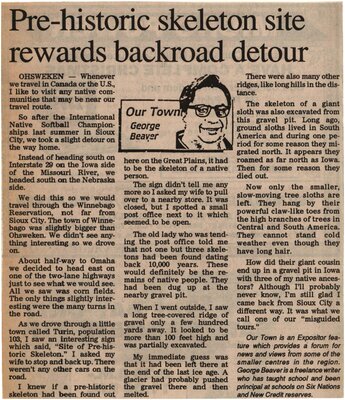"Pre-historic skeleton site rewards backroad detour"
- Publication
- Brantford Expositor, 1991
- Full Text
- Pre-historic skeleton site rewards backroad detour
OHSWEKEN - Whenever we travel in Canada or the U.S., I like to visit any native communities that may be near our travel route.
So after the International Native Softball Championships last summer in Sioux City, we took a slight detour on the way home.
Instead of heading south on Interstate 29 on the Iowa side of the Missouri River, we headed south on the Nebraska side.
We did this so we would travel through the Winnebago Reservation, not far from Sioux City. The town of Winnebago was slightly bigger than Ohsweken. We didn't see anything interesting so we drove on.
About half-way to Omaha we decided to head east on one of the two-lane highways just to see what we would see. All we saw was corn fields. The only things slightly interesting were the many turns in the road.
As we drove through a little town called Turin, population 103, I saw an interesting sign which said, "Site of Pre-historic Skeleton." I asked my wife to stop and back up. There weren't any other cars on the road.
I knew if a pre-historic skeleton had been found out here on the Great Plains, it had to be the skeleton of a native person.
The sign didn't tell me any more so I asked my wife to pull over to a nearby store. It was closed, but I spotted a small post office next to it which seemed to be open.
The old lady who was tending the post office told me that not one but three skeletons had been found dating back 10,000 years. These would definitely be the remains of native people. They had been dug up at the nearby gravel pit.
When I went outside, I saw a long tree-covered ridge of gravel only a few hundred yards away. It looked to be more than 100 feet high and was partially excavated.
My immediate guess was that it had been left there at the end of the last ice age. A glacier had probably pushed the gravel there and then melted.
There were also many other ridges, like long hills in the distance.
The skeleton of a giant sloth was also excavated from this gravel pit. Long ago, ground sloths lived in South America and during one period for some reason they migrated north. It appears they roamed as far north as Iowa. Then for some reason they died out.
Now only the smaller, slow-moving tree sloths are left. They hang by their powerful claw-like toes from the high branches of trees in Central and South America. They cannot stand cold weather even though they have long hair.
How did their giant cousin end up in a gravel pit in Iowa with three of my native ancestors? Although I'll probably never know, I'm still glad I came back from Sioux City a different way. It was what we call one of our "misguided tours."
Our Town is an Expositor feature which provides a forum for news and views from some of the smaller centres in the region. George Beaver is a freelance writer who has taught school and been principal at schools on Six Nations and New Credit reserves.
- Creator
- Beaver, George, Author
- Media Type
- Newspaper
- Publication
- Item Types
- Articles
- Clippings
- Description
- "As we drove through a little town called Turin, population 103, I saw an interesting sign which said, `Site of Pre-historic Skeleton`"
- Date of Publication
- 1991
- Local identifier
- SNPL003295v00d
- Language of Item
- English
- Creative Commons licence
 [more details]
[more details]- Copyright Statement
- Public domain: Copyright has expired according to Canadian law. No restrictions on use.
- Copyright Date
- 1991
- Copyright Holder
- Brantford Expositor
- Contact
- Six Nations Public LibraryEmail:info@snpl.ca
Website:
Agency street/mail address:1679 Chiefswood Rd
PO Box 149
Ohsweken, ON N0A 1M0
519-445-2954



